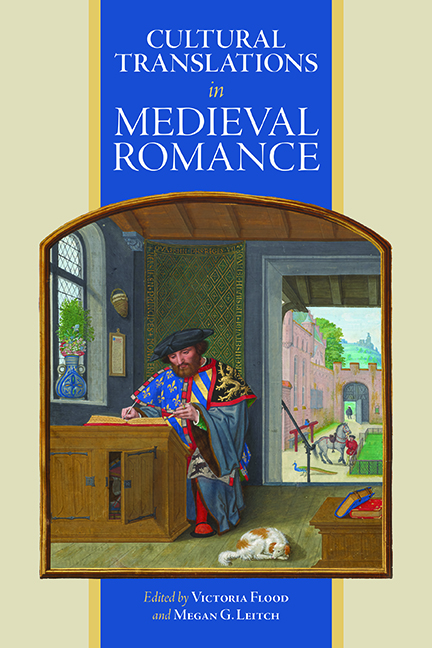Book contents
- Frontmatter
- Contents
- List of Contributors
- List of Abbreviations
- Introduction Insular Romance in Translation: New Approaches
- 1 Romantic Wales: Imagining Wales in Medieval Insular Romance
- 2 ‘Something remains which is not open to my understanding’: Enigmatic Marvels in Welsh Otherworld Narratives and Latin Arthurian Romance
- 3 The Supernatural Company in Cultural Translation: Dafydd ap Gwilym and the Roman de la Rose Tradition
- 4 Women and Werewolves: William of Palerne in Three Cultures
- 5 ‘Better a valiant squire than a cowardly knight’: Gender in Guruns strengleikr (The Lay of Gurun)
- 6 ‘Vinegar upon Nitre’? Walter Map’s Romance of ‘Sadius and Galo’
- 7 The Three Barriers to Closure in Hue de Rotelande’s Ipomedon and the Middle English Translations
- 8 Trojan Trash? The Seege or Batayle of Troye and the Learning of ‘Popular’ Romance
- 9 Poaching Romance: Fan Fiction Theory and Shared Medieval Narratives
- 10 Between Epic and Romance: The Matter of England and the Chansons de Geste
- 11 Geographies of Loss: Cilician Armenia and the Prose Romance of Melusine
- 12 ‘All this will not comfort me’: Romancing the Ballad in The Squire of Low Degree
- 13 Merchants in Shining Armour: Chivalrous Interventions and Social Mobility in Late Middle English Romance
- Index of Manuscripts
- General Index
- Miscellaneous Endmatter
13 - Merchants in Shining Armour: Chivalrous Interventions and Social Mobility in Late Middle English Romance
Published online by Cambridge University Press: 07 October 2022
- Frontmatter
- Contents
- List of Contributors
- List of Abbreviations
- Introduction Insular Romance in Translation: New Approaches
- 1 Romantic Wales: Imagining Wales in Medieval Insular Romance
- 2 ‘Something remains which is not open to my understanding’: Enigmatic Marvels in Welsh Otherworld Narratives and Latin Arthurian Romance
- 3 The Supernatural Company in Cultural Translation: Dafydd ap Gwilym and the Roman de la Rose Tradition
- 4 Women and Werewolves: William of Palerne in Three Cultures
- 5 ‘Better a valiant squire than a cowardly knight’: Gender in Guruns strengleikr (The Lay of Gurun)
- 6 ‘Vinegar upon Nitre’? Walter Map’s Romance of ‘Sadius and Galo’
- 7 The Three Barriers to Closure in Hue de Rotelande’s Ipomedon and the Middle English Translations
- 8 Trojan Trash? The Seege or Batayle of Troye and the Learning of ‘Popular’ Romance
- 9 Poaching Romance: Fan Fiction Theory and Shared Medieval Narratives
- 10 Between Epic and Romance: The Matter of England and the Chansons de Geste
- 11 Geographies of Loss: Cilician Armenia and the Prose Romance of Melusine
- 12 ‘All this will not comfort me’: Romancing the Ballad in The Squire of Low Degree
- 13 Merchants in Shining Armour: Chivalrous Interventions and Social Mobility in Late Middle English Romance
- Index of Manuscripts
- General Index
- Miscellaneous Endmatter
Summary
This chapter analyses how merchant characters intervene in romance narratives, and how their interventions offer ideological challenges that reflect on the changing production and reception of romances in late medieval England. In so doing, it addresses this volume's concerns with translatio as movement of power (in the appropriation of romance and its tropes to offer a critique informed by changing social structures and class politics) and also as movement of texts (in terms of the writing of late romances and their readership and circulation). From the perspective of medieval authorities, merchants are generally viewed with some mistrust or hostility, and the same goes for merchants in romance. However, in some late Middle English romances, merchants come across rather more positively than is generally the case in the genre. Emaré, Sir Degaré, Octavian, and Valentine and Orson all feature merchants who seem to be motivated by altruism rather than by avarice. Yet the ideological challenges romance merchants pose are manifested when they help central characters, at least as much as when they hinder them. In these romances, it is when men of aristocratic status behave badly – and towards ladies in particular – that merchants step in to help or rescue the lady. I approach these cases in which merchants rescue princesses as examples of what I shall call a motif of merchants in shining armour, and expose the ways in which, through this motif, late Middle English romance is transformed or troubled by contact with new (or newly powerful) class-based ideological agendas.
The final portion of this chapter assesses how the manuscript history of these four romances suggests that late Middle English romance evolved to be especially receptive to the class-centred critique these merchants offer. Emaré, Sir Degaré, Octavian, and Valentine and Orson were all either copied or composed between the mid-fifteenth century and the early sixteenth, and their popularity coincides with shifts in social power. During this period, more merchants were increasingly reading and owning romances and merchants were also increasingly intermingling with the knightly classes, and/or being knighted themselves. In this context, the rewriting of the romance trope of knights rescuing damsels in distress to instead feature merchants rescuing damsels in distress reads as a political transformation or translation of the expectations of the genre.
- Type
- Chapter
- Information
- Cultural Translations in Medieval Romance , pp. 245 - 262Publisher: Boydell & BrewerPrint publication year: 2022

